 |
Rana Kumbha (1433-1468) |
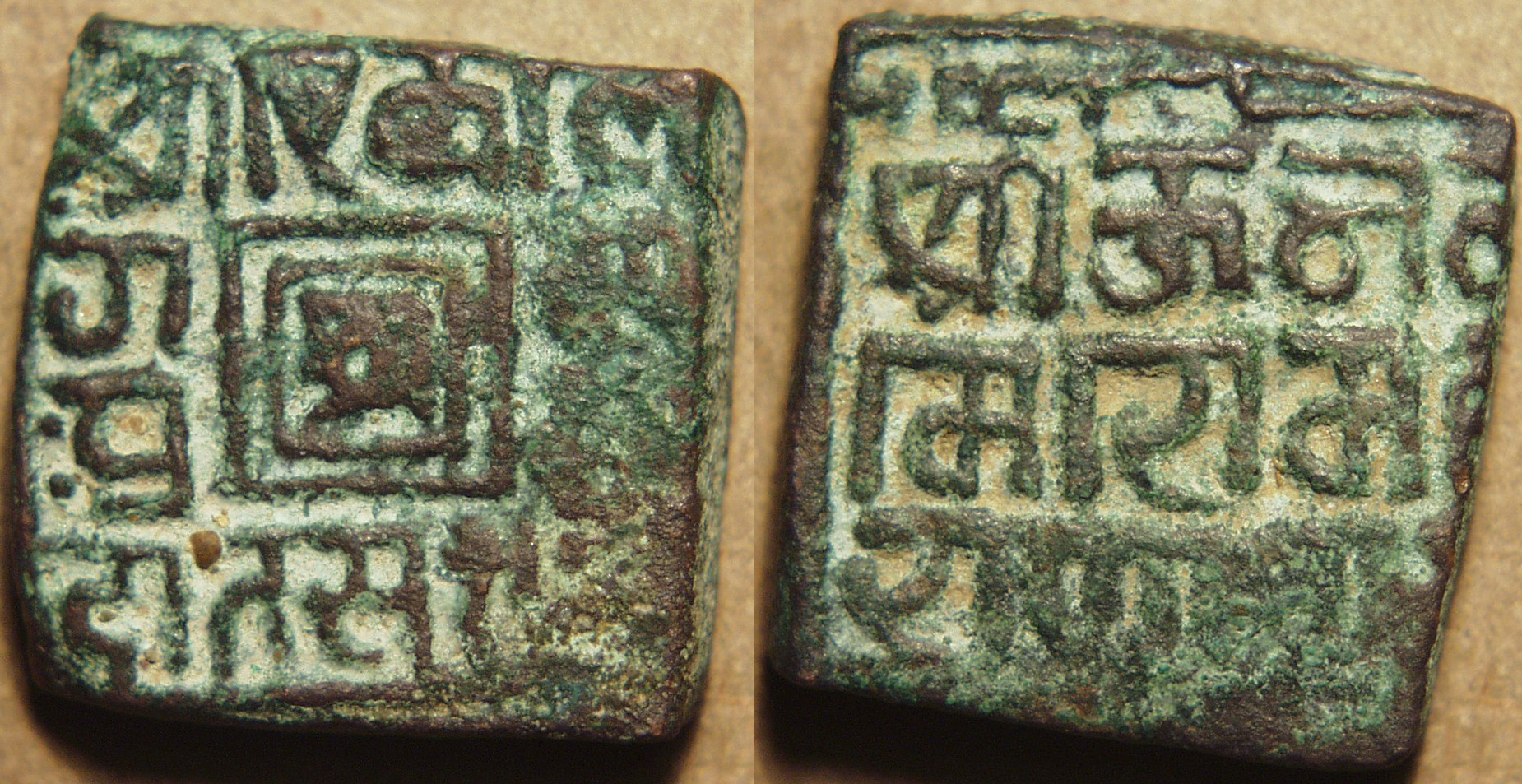
|
Rana Kumbha (1433-1468) copper unit
Weight: 13.18 gm. Dimensions: 21 x 20 mm Die axis: 3 o'clock
Devanagari sri, surrounded by legend: sri ekalin / ga .. ma / hapra .. sa / data sam 1xxx /
Devanagari legend: sri kumbhala / meru maha / rana ...
Reference:
|
 |
Ekalinga is a name of Shiva and was the presiding deity of the Mewar royal house. The maharana ruled in his name.
|
 |
 |
 |
Rana Raimalla (1473-1509) |
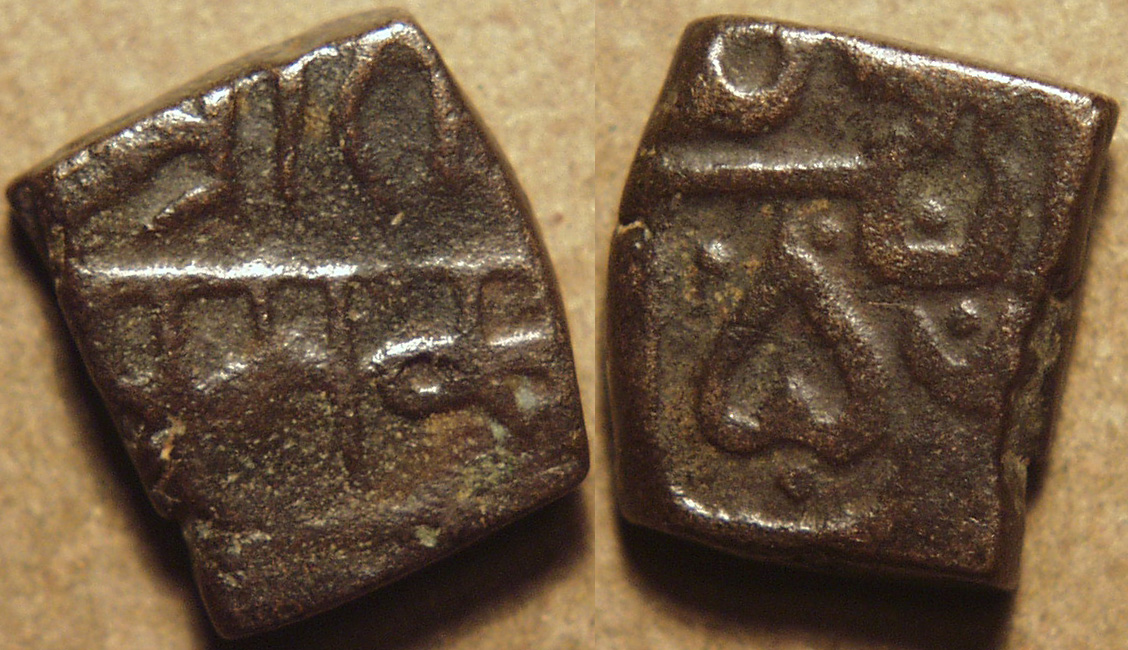
|
Rana Raimalla (1473-1509) AE half falus
Weight: 3.67 gm. Dimensions: 11 x 13 mm Die axis: 12 o'clock
Nagari legend: sri ra(na ra) / yamalla /
Legend imitating coins of Malwa sultans
Reference: unpublished
|
 |
This is the first known coin of Rana Raimalla. It can be quite conclusively identified by the presence of the unusual last letter
in the second line, a retroflex la still used in the Marathi script and here standing for the double la in the king's name. Raimalla was the younger son of Rana
Kumbha, who succeeded to the throne after deposing his older brother Uda. Uda had murdered his father in order to attain the throne and faced considerable opposition
from the nobles of the realm.
|
 |
 |
 |
Rana Sanga (Sangram Singh) (1509-1527) |
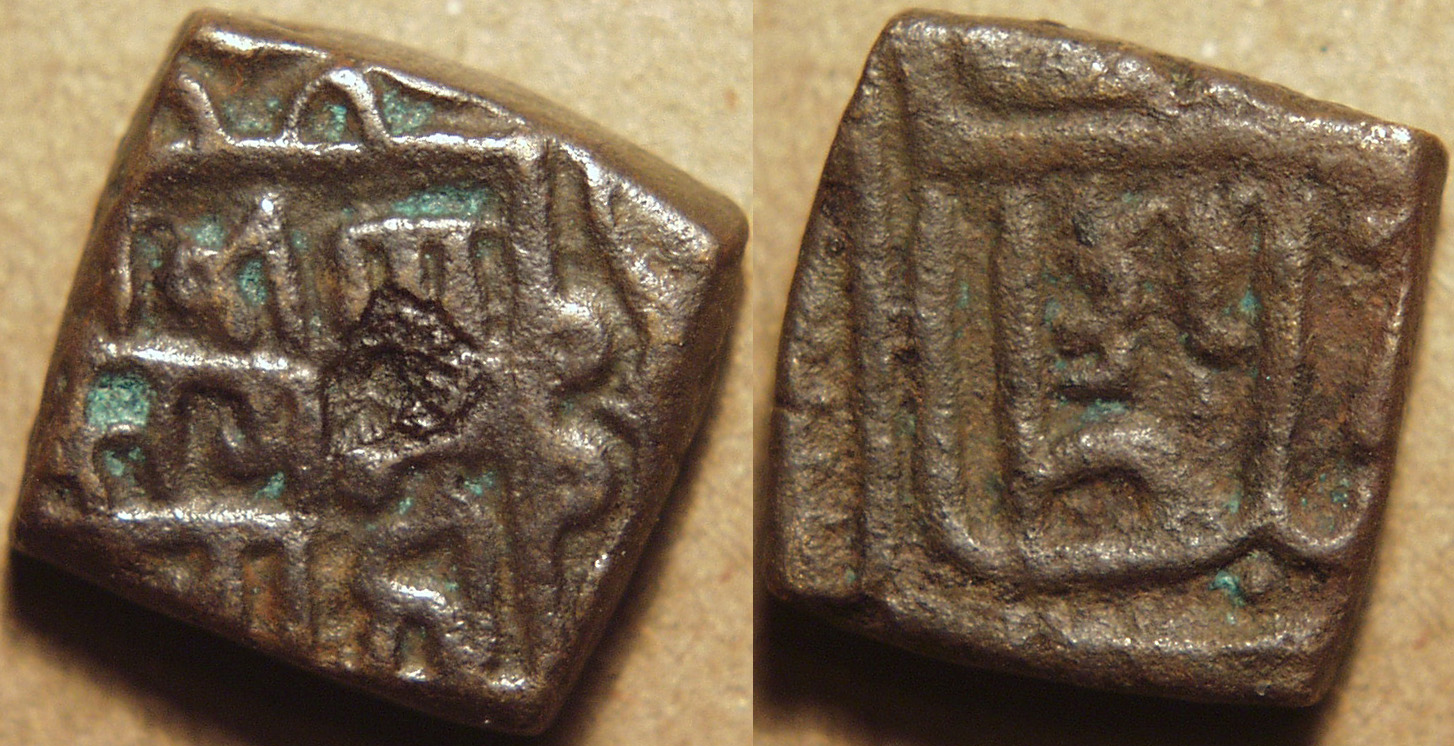
|
Sangram Singh (1509-1527) AE falus
Weight: 7.34 gm. Dimensions: 15 x 15 mm Die axis: 3 o'clock
Devanagari legend: (sri) rana / sangram / sahi /
Persian legend in the style of the Malwa sultans
Reference: Goron-Goenka M267
|
 |
Rana Sanga waged successful wars against the sultan of Malwa and Ibrahim Lodi of Delhi, bur he was eventually defeated by
the Mughal invader Babur.
|

|
Sangram Singh (1509-1527) AE falus
Weight: 8.10 gm. Dimensions: 16 x 16 mm Die axis: 9 o'clock
Devanagari legend: sri rana (san) / gram saha / 1575 /
Blundered Persian legend in the style of the Malwa sultans
Reference: Goron-Goenka M269
|
 |
This coin is dated 1575 in the Vikram era, equivalent to the year 1518.
|
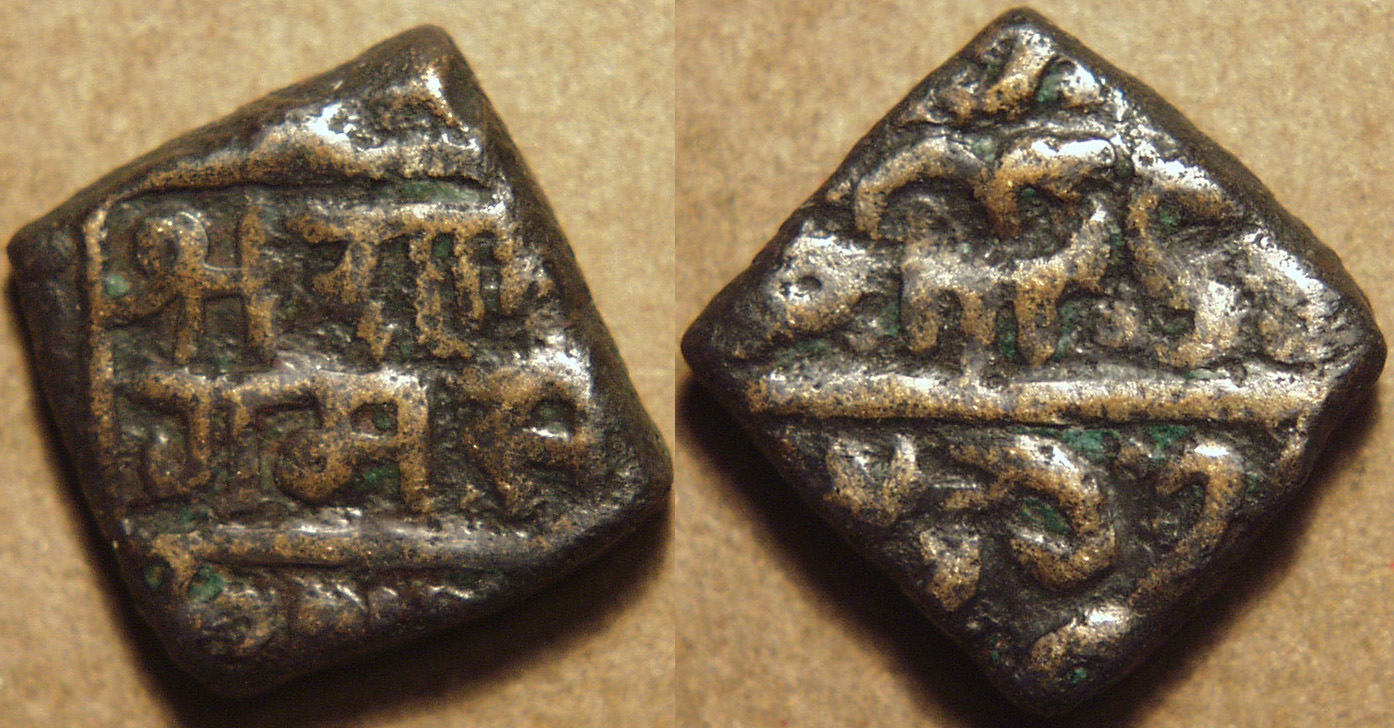
|
Sangram Singh (1509-1527) AE half falus
Weight: 3.87 gm. Dimensions: 13 x 13 mm Die axis: 3 o'clock
Devanagari legend: sri rana (san) / gram saha /
Blundered Persian legend in the style of the Malwa sultans
Reference: Goron-Goenka M270
|
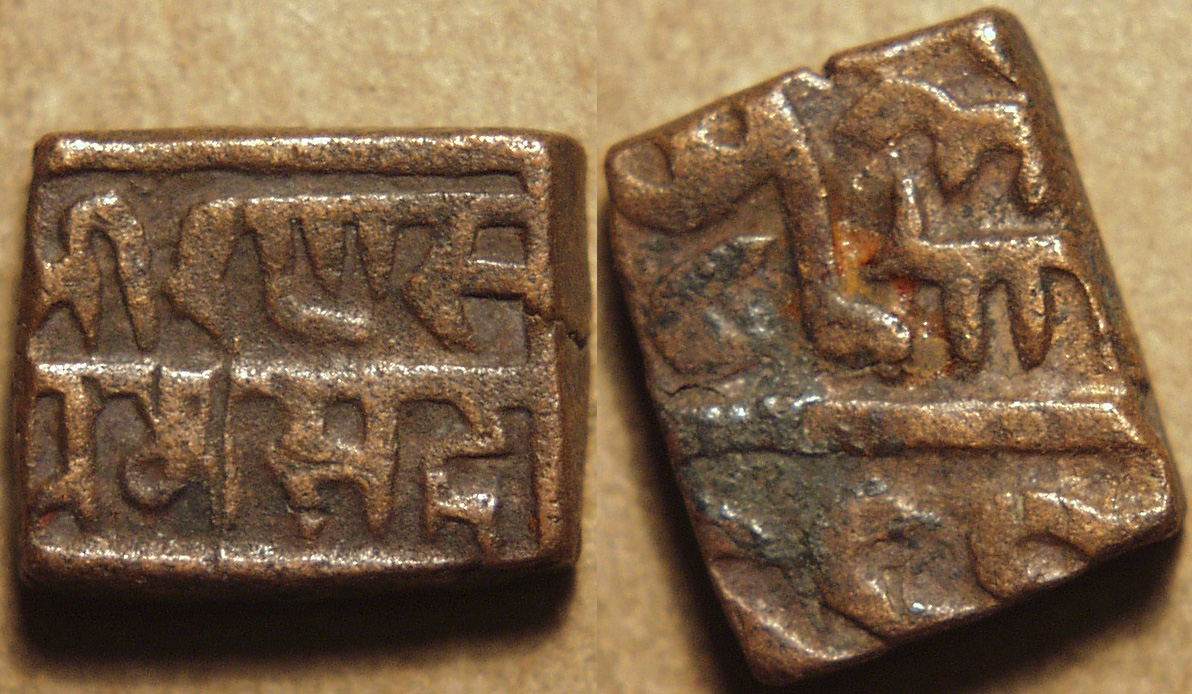
|
Sangram Singh (1509-1527) AE half falus
Weight: 4.03 gm. Dimensions: 14 x 11 mm Die axis: 10 o'clock
Devanagari legend: sri rana san / gram sahi /
Blundered Persian legend in the style of the Malwa sultans
Reference: Goron-Goenka M270
|
 |
Vikramaditya Singh (1531-1537) |
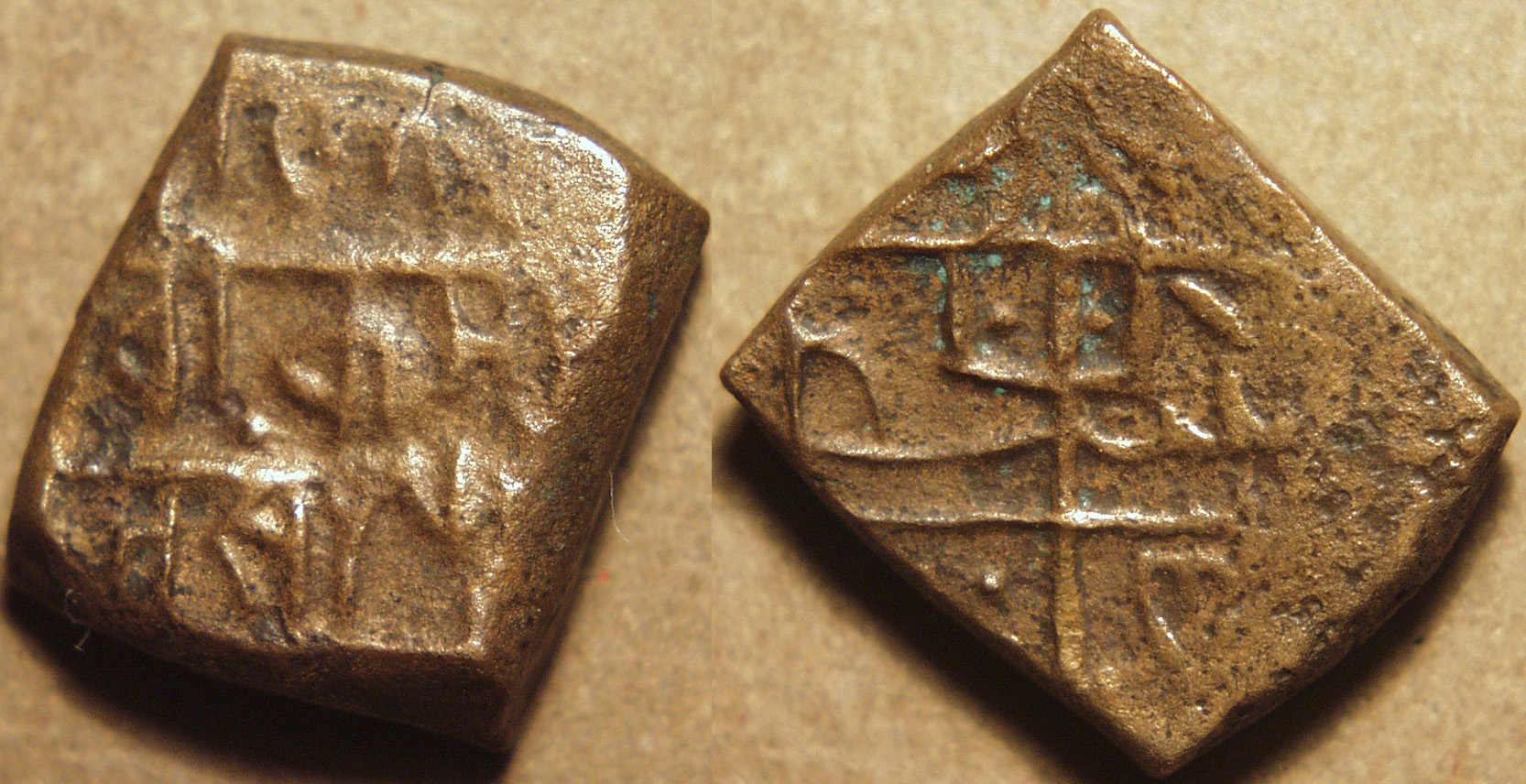
|
Vikramaditya Singh (1531-1537) AE falus
Weight: 8.33 gm. Dimensions: 15 x 17 mm Die axis: 3 o'clock
Devanagari legend: sri rana / vikramadi / ta sam 15xx /
Persian legend in the style of the Malwa sultans
Reference: Goron-Goenka M271
|
 |
Vikramaditya Singh's successor was Banbir Singh (1537-1540), whose coins are known. But no coins are known
for his successor, Udai Singh II (1540-1568), despite his long reign. Udai Singh was defeated by Akbar and had to move his capital to Udaipur as Akbar
seized Chittor.
|
 |
 |
 |
Chitori Series (late 18th century) |
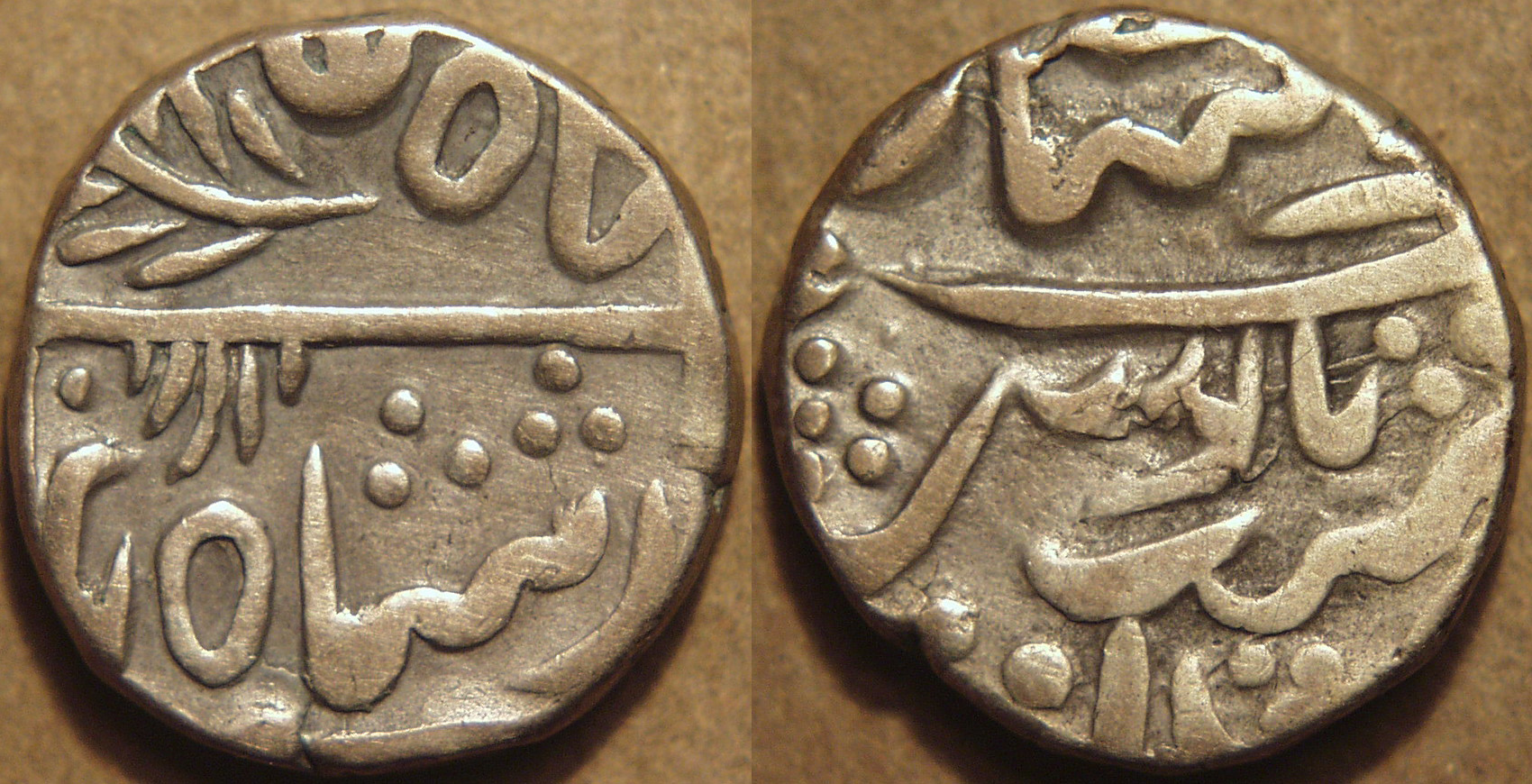
|
Silver rupee in the name of Alamgir II (c. 18th century)
Weight: 10.70 gm. Diameter: 20 mm Die axis: 7 o'clock
Legend in the name of Alamgir II, Udaipur mintmark /
Legend with fictitious mint name dar al khilafat shahjahanabad
Reference: KM 26
|
 |
According to Mitchiner (he does not cite his sources), the mints at Chitor and Udaipur were opened after 1707, during
the reign of Shah Alam Bahadur (1707-12). The sprig on this coin indicates it was minted in Udaipur.
|
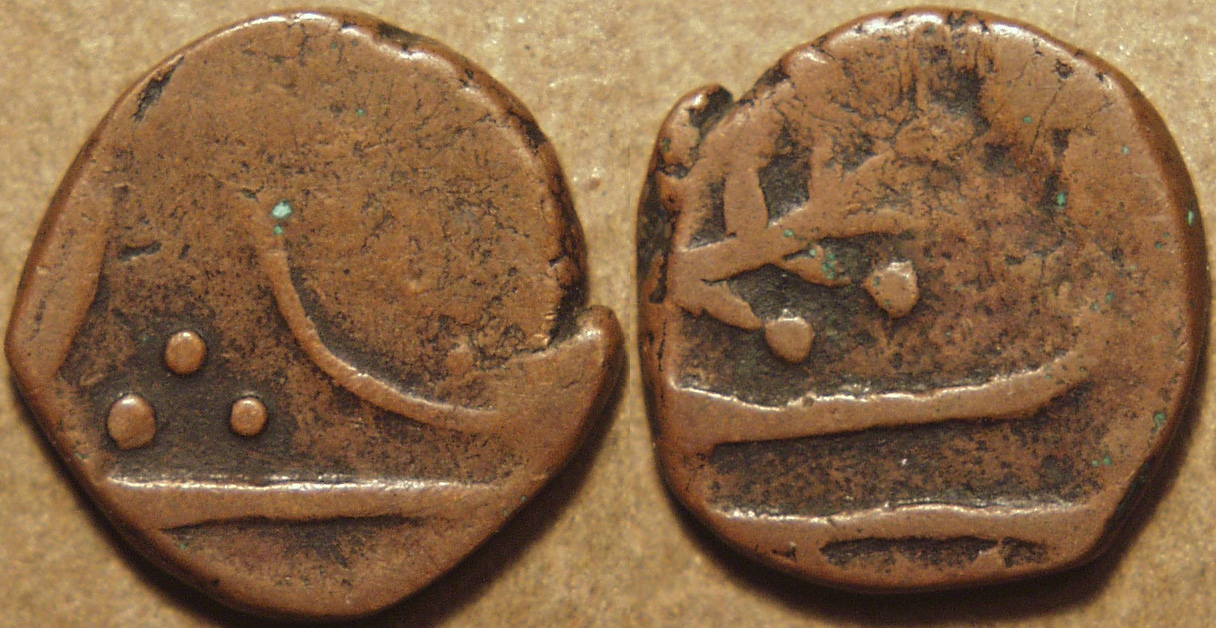
|
Anonymous AE paisa (c. 18th century)
Weight: 2.29 gm. Diameter: 14 mm Die axis: 11 o'clock
Legend in the name of Alamgir II ?, Udaipur mintmark /
Banner or trident ?
Reference: KM ---
|
 |
Neither KM nor Mitchiner list any copper coins from this period, but this coin, with its Udaipur mint mark of the sprig, seems
quite clearly to belong to it.
This coin, and the last four on this page (see below) have a soft spot in my collector's heart. They excited my interest in coins when, as a boy of around 10, I saw them
in my grandmother's small change box and managed to persuade her to let me have them. They seemed so strange and mysterious, and started me off on the road as
a coin collector.
|
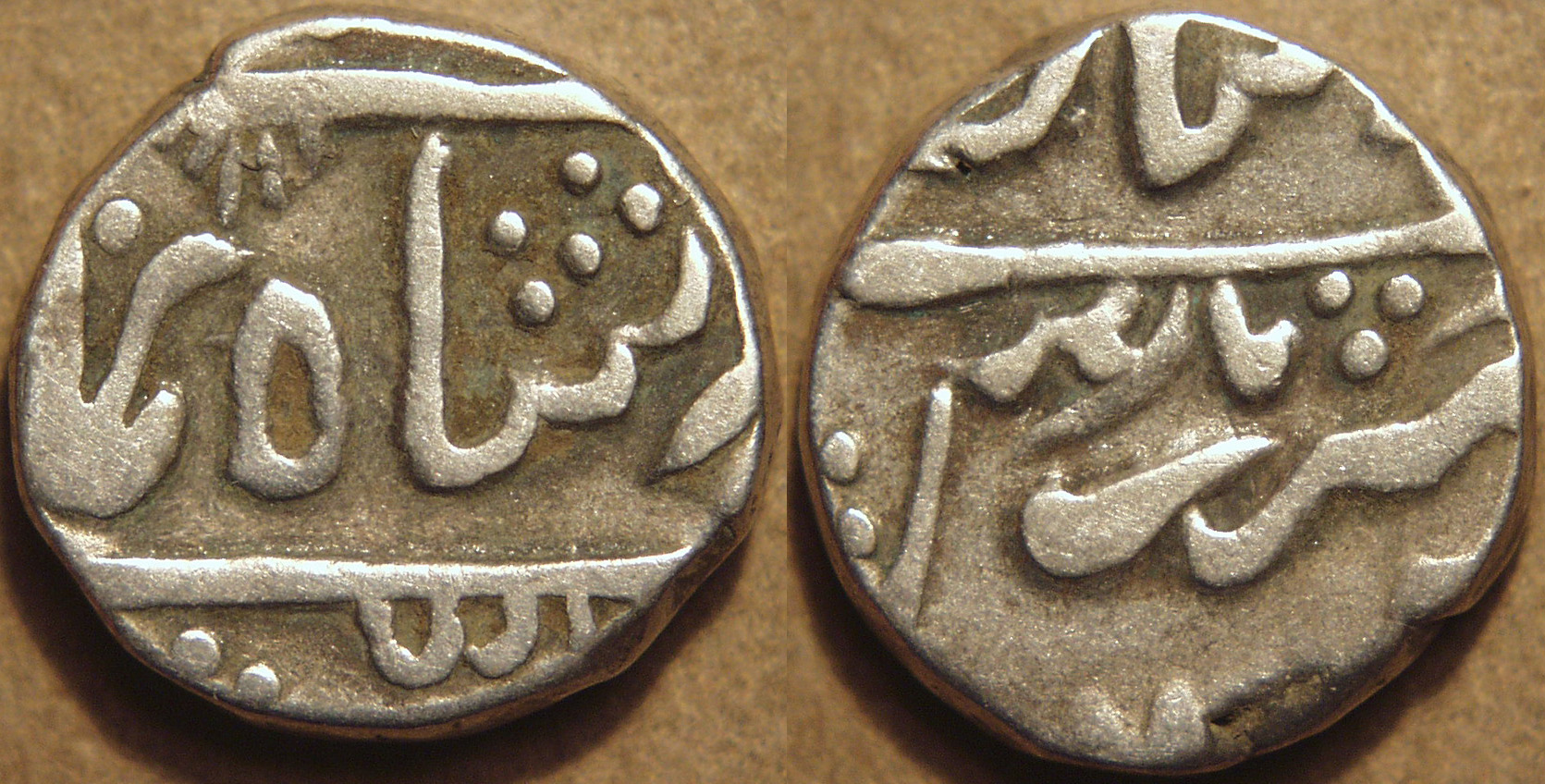
|
Silver rupee in the name of Alamgir II (c. 18th century)
Weight: 10.77 gm. Diameter: 20 mm Die axis: 9 o'clock
Legend in the name of Alamgir II, Chitor mintmark /
Legend with fictitious mint name dar al khilafat shahjahanabad
Reference: KM 26
|
 |
The mint mark of Chitor was the series of rays suspended from the dividing line in the obverse.
|
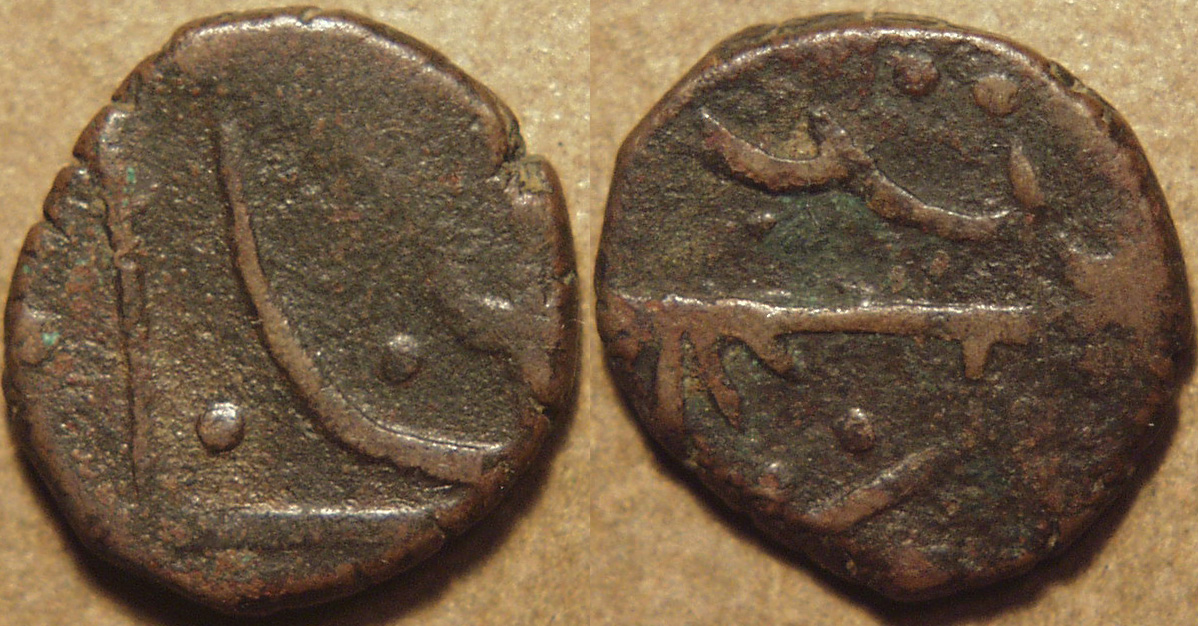
|
Anonymous AE paisa (c. 18th century)
Weight: 2.61 gm. Diameter: 14 mm Die axis: 7 o'clock
Legend in the name of Alamgir II ?, Chitor mintmark /
Banner or trident ?
Reference: KM ---
|
 |
Neither KM nor Mitchiner list any copper coins from this period, but this coin, with its Chitor mint mark of rays, seems
quite clearly to belong to it.
|
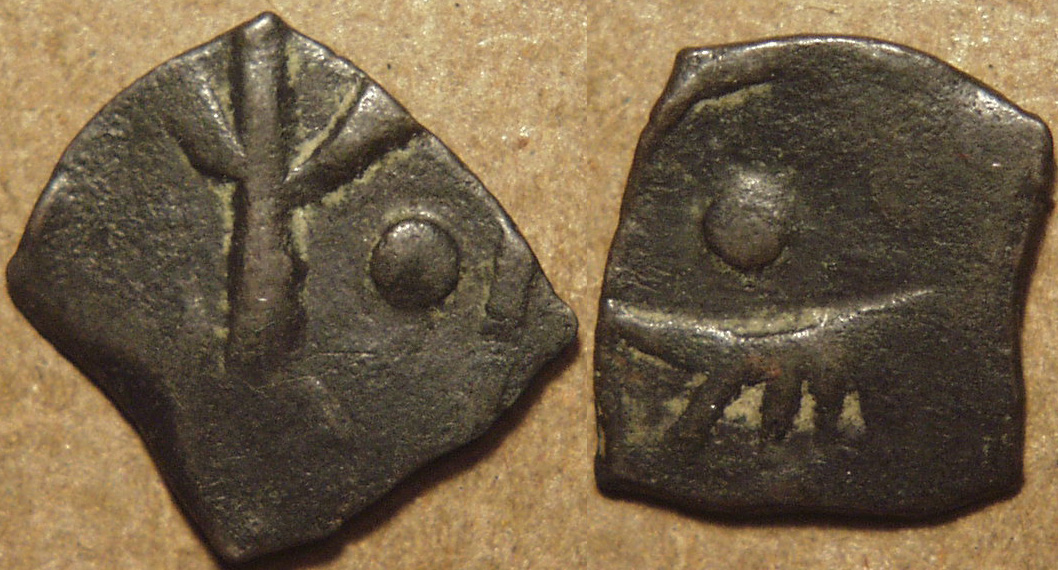
|
Anonymous AE fractional paisa (c. 18th century)
Weight: 0.73 gm. Diameter: 11 x 12 mm Die axis: 2 o'clock
Legend in the name of Alamgir II ?, Chitor mintmark /
Banner or trident ?
Reference: KM ---
|
 |
Also an unlisted type, this coin is on a very thin flan, which makes it clear that it was a smaller denomination than
the previous coin. But it has the Chitor mint mark and the trident on the reverse.
|
 |
 |
 |
New Chandori Series (c. 1822-1852) |
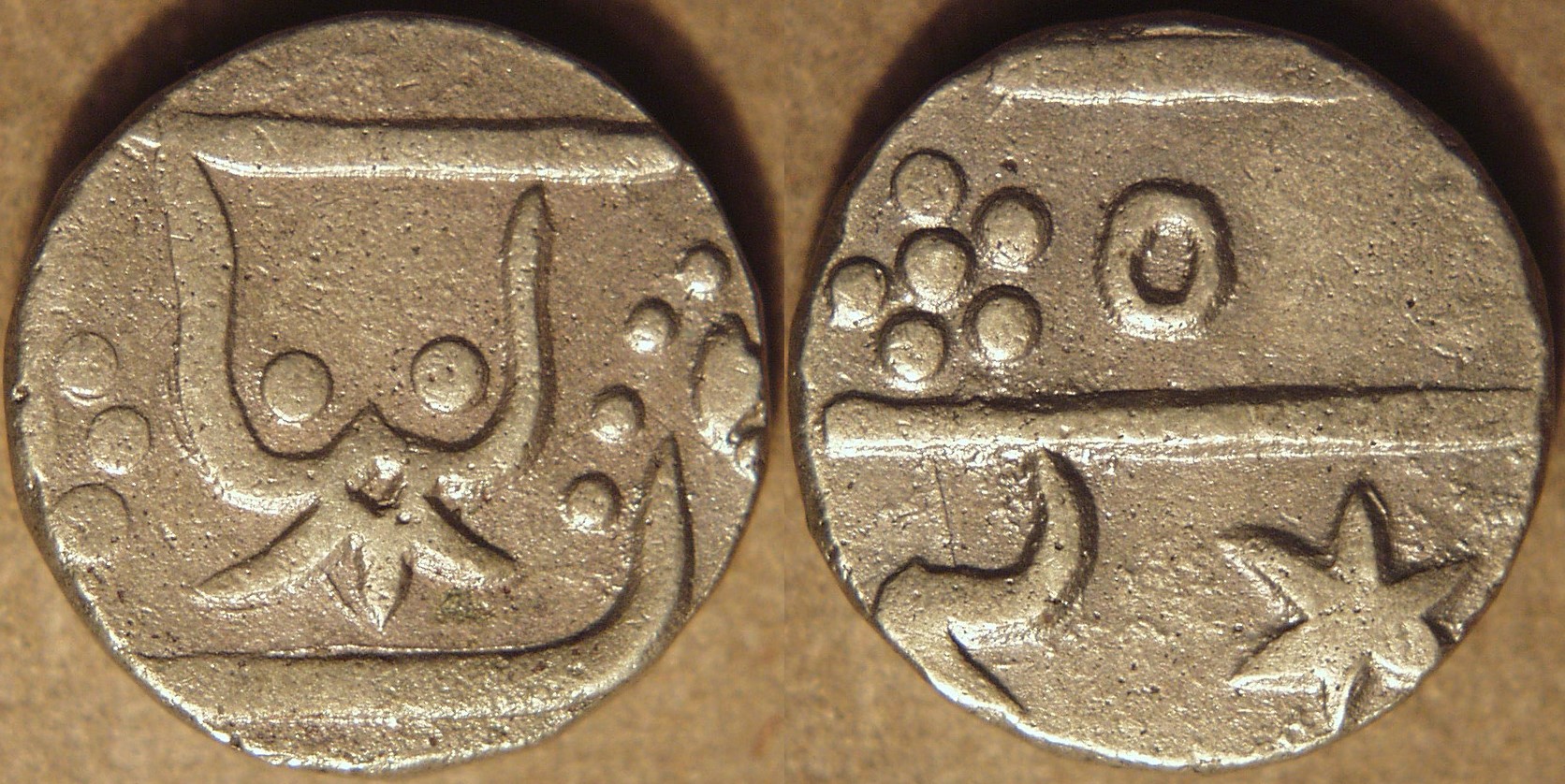
|
Anonymous Silver rupee (c. 1822-52)
Weight: 10.60 gm. Diameter: 20 mm Die axis: 11 o'clock
Udaipur mintmark /
Udaipur mintmark
Reference: KM Y5
|
 |
The "New Chandori" series of coins were struck in Udaipur some time during the first half of the nineteenth century. Mewar had
come under British protection in 1818, and this series may have commenced soon afterwards, perhaps first ordered by Rana Bhim SIngh (1778-1828) and continued
under his successors Jawan Singh (1828-38) and Sirdar Singh (1828-42).
|
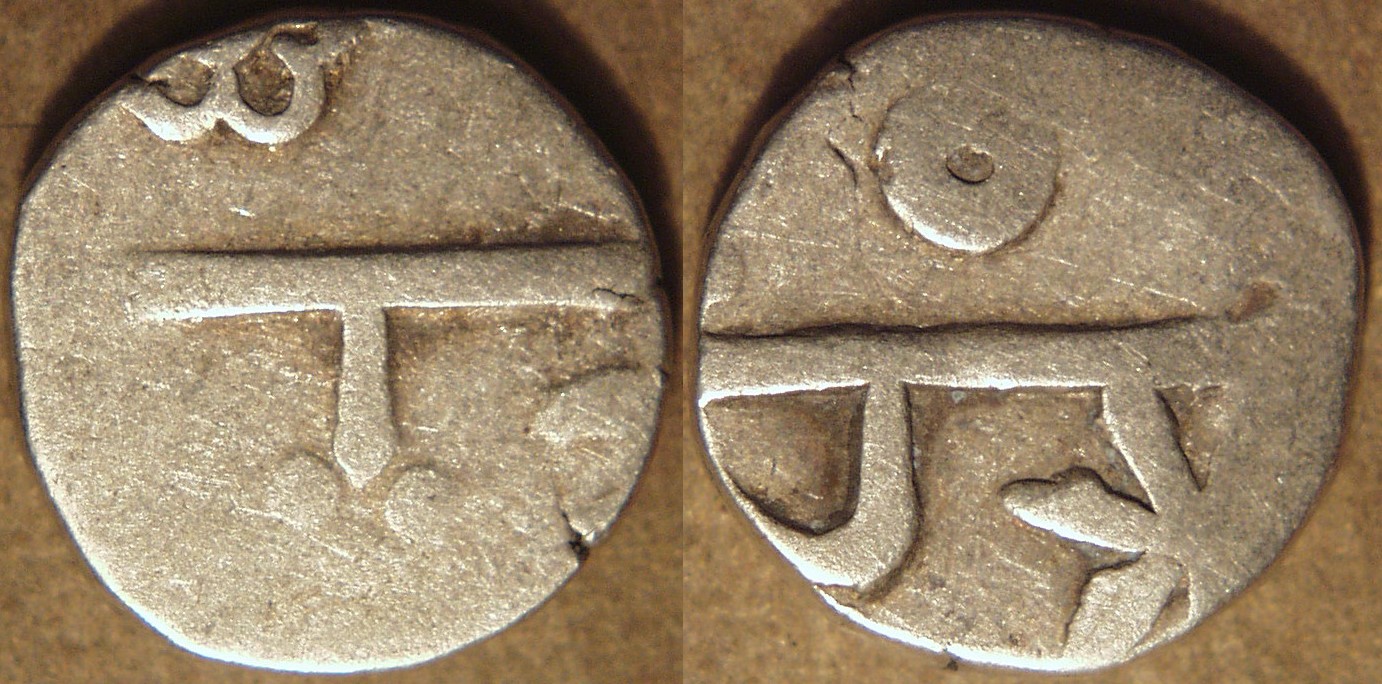
|
Anonymous Silver half rupee (c. 1822-52)
Weight: 5.26 gm. Diameter: 16 mm Die axis: 3 o'clock
Udaipur mintmark /
Udaipur mintmark
Reference: KM Y4
|
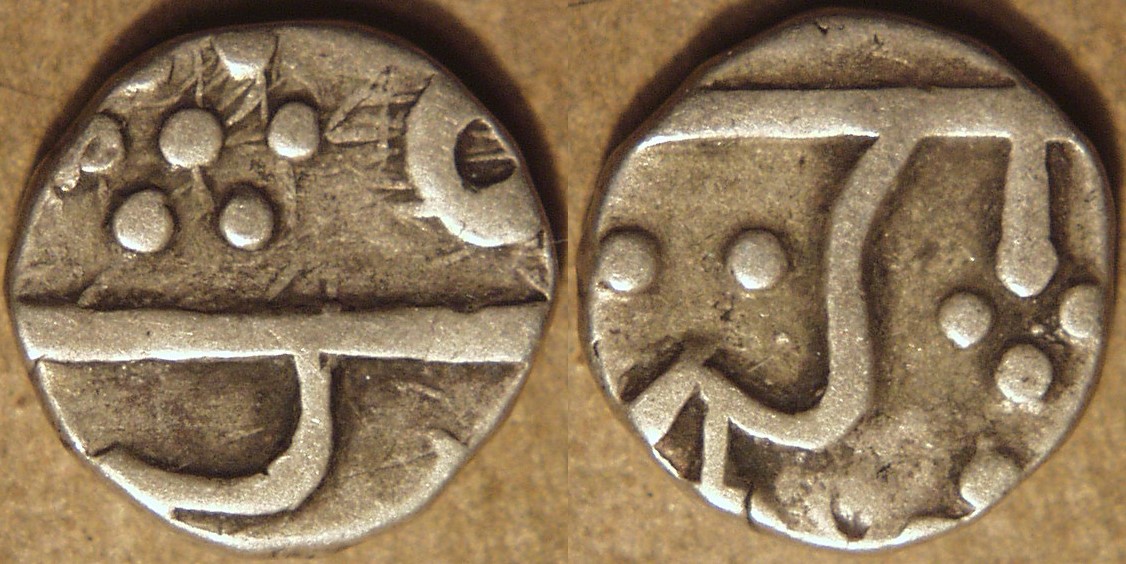
|
Anonymous Silver quarter rupee (c. 1822-52)
Weight: 2.67 gm. Diameter: 13 mm Die axis: 10 o'clock
Udaipur mintmark /
Udaipur mintmark
Reference: KM Y3
|
 |
Ex-Ken Wiggins collection.
|
 |
 |
 |
Swarup Shahi Series (c. 1852-1930) |
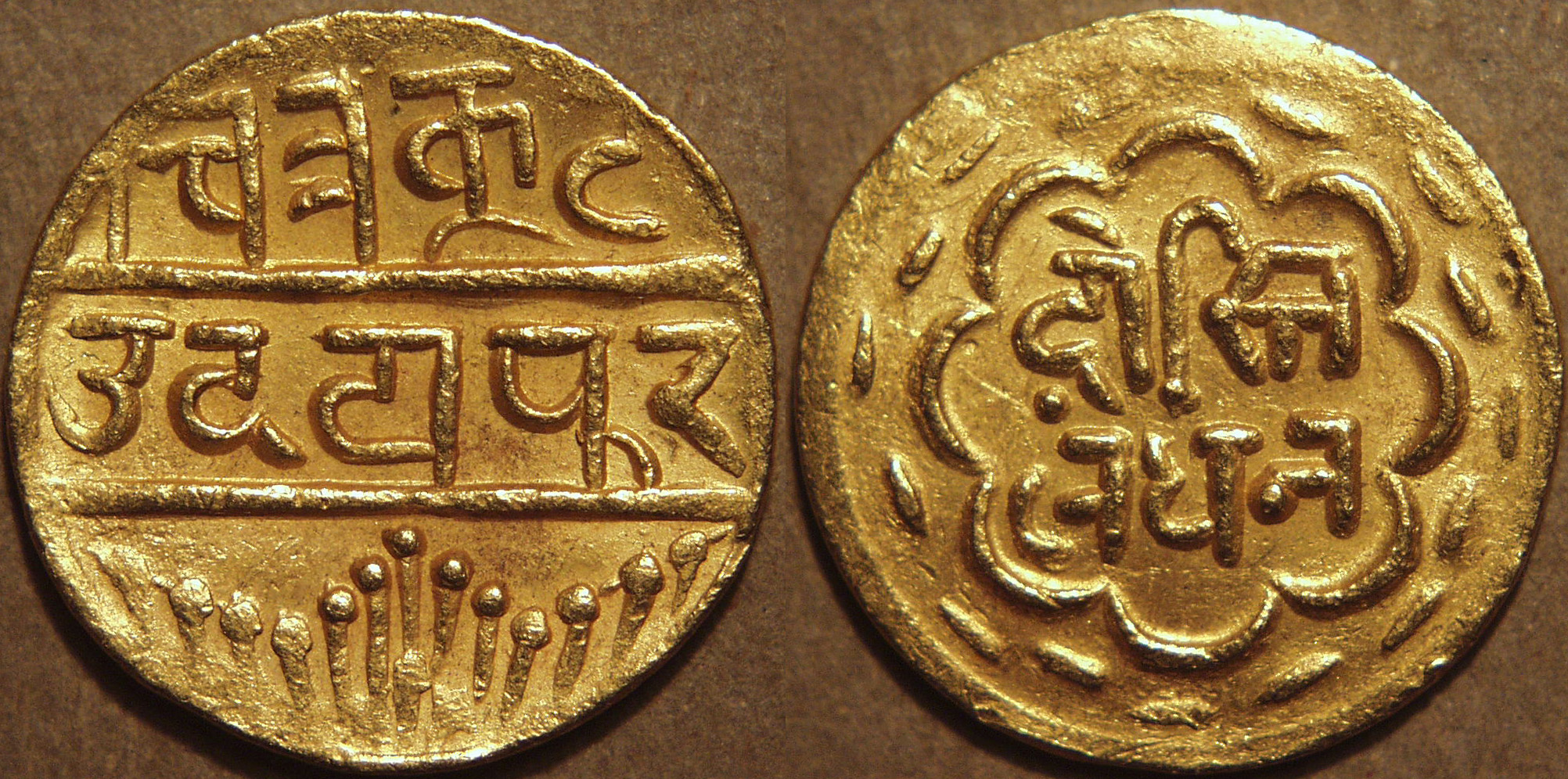
|
Anonymous Gold mohur (c. 1852-1930)
Weight: 10.94 gm. Diameter: 24 mm Die axis: 6 o'clock
Nagari legend chitrakut udaipur with idealized representation of the ramparts of Chittorgarh below. /
Nagari legend: dosti landhan (friends of London) within decorative border
Reference: KM Y12
|
 |
In the mid-19th century, as the British control over India grew, many states were pressured into placing the name of the
British sovereign on their coins. Mewar resisted this pressure and compromised by inserting the legend "friends of London" on this new coin series. The obverse of
the coin evoked the ancient Mewari capital of Chitrakut (Chitor), both in the legend and in the abstaract representation of the Chittorgarh fort in the design.
The so-called "Swarup Shahi" series was originally issued in the reign of Swarup SIngh (1842-61), but continued to be minted during the subsequent reigns of
Shambhu Singh (1861-74), Sajjan Singh (1874-84) and Fatteh Singh (1874-1930).
|

|
Anonymous Gold quarter mohur (c. 1852-1930)
Weight: 3.30 gm. Diameter: 14 mm Die axis: 12 o'clock
Nagari legend chitrakut udaipur with idealized representation of the ramparts of Chittorgarh below. /
Nagari legend: dosti landhan (friends of London) within decorative border
Reference: KM Y A12
|

|
Anonymous Silver rupee (c. 1852-1930)
Weight: 10.72 gm. Diameter: 24 mm Die axis: 12 o'clock
Nagari legend chitrakut udaipur with idealized representation of the ramparts of Chittorgarh below. /
Nagari legend: dosti landhan (friends of London) within decorative border
Reference: KM Y11
|

|
Anonymous Silver rupee (c. 1852-1930)
Weight: 10.81 gm. Diameter: 24 mm Die axis: 7 o'clock
Nagari legend chitrakut udaipur with idealized representation of the ramparts of Chittorgarh below. /
Nagari legend: dosti landhan (friends of London) within decorative border
Reference: KM Y11
|
 |
Notice the cruder form of the letter pa in the word "Udaipur" and the more elaborate ramparts of the fort.
|

|
Anonymous Silver half rupee (c. 1852-1930)
Weight: 5.34 gm. Diameter: 18 mm Die axis: 11 o'clock
Nagari legend chitrakut udaipur with idealized representation of the ramparts of Chittorgarh below. /
Nagari legend: dosti landhan (friends of London) within decorative border
Reference: KM Y10
|

|
Anonymous Silver quarter rupee (c. 1852-1930)
Weight: 2.50 gm. Diameter: 14 mm Die axis: 10 o'clock
Nagari legend chitrakut udaipur with idealized representation of the ramparts of Chittorgarh below. /
Nagari legend: dosti landhan (friends of London) within decorative border
Reference: KM Y9
|
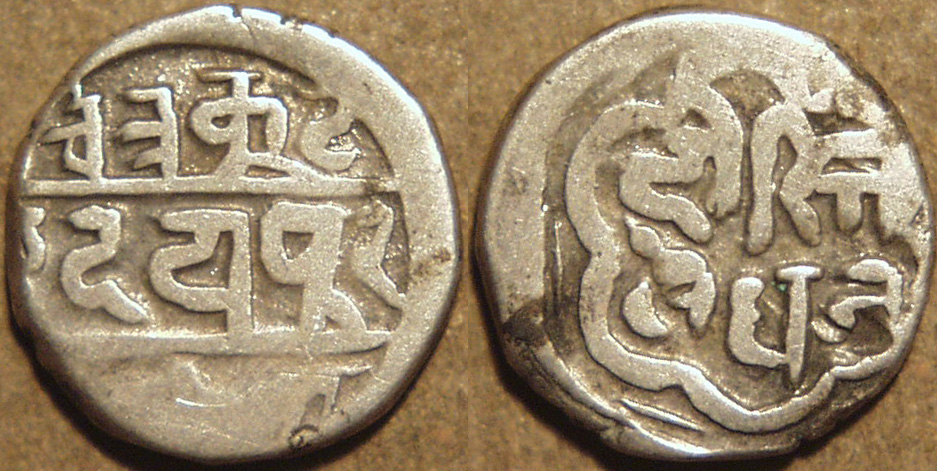
|
Anonymous Silver one-eighth rupee (c. 1852-1930)
Weight: 1.22 gm. Diameter: 11 mm Die axis: 9 o'clock
Nagari legend chitrakut udaipur with idealized representation of the ramparts of Chittorgarh below. /
Nagari legend: dosti landhan (friends of London) within decorative border
Reference: KM Y8
|
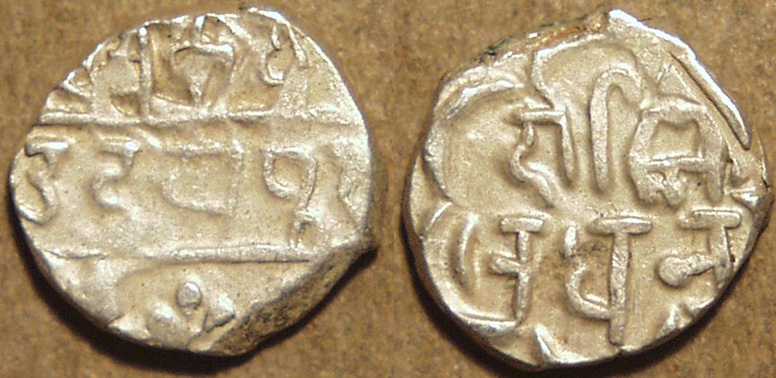
|
Anonymous Silver one-sixteenth rupee (c. 1852-1930)
Weight: 0.68 gm. Diameter: 9 mm Die axis: 9 o'clock
Nagari legend chitrakut udaipur with idealized representation of the ramparts of Chittorgarh below. /
Nagari legend: dosti landhan (friends of London) within decorative border
Reference: KM Y7
|
 |
Fatteh Shahi Series (c. 1931-32) |
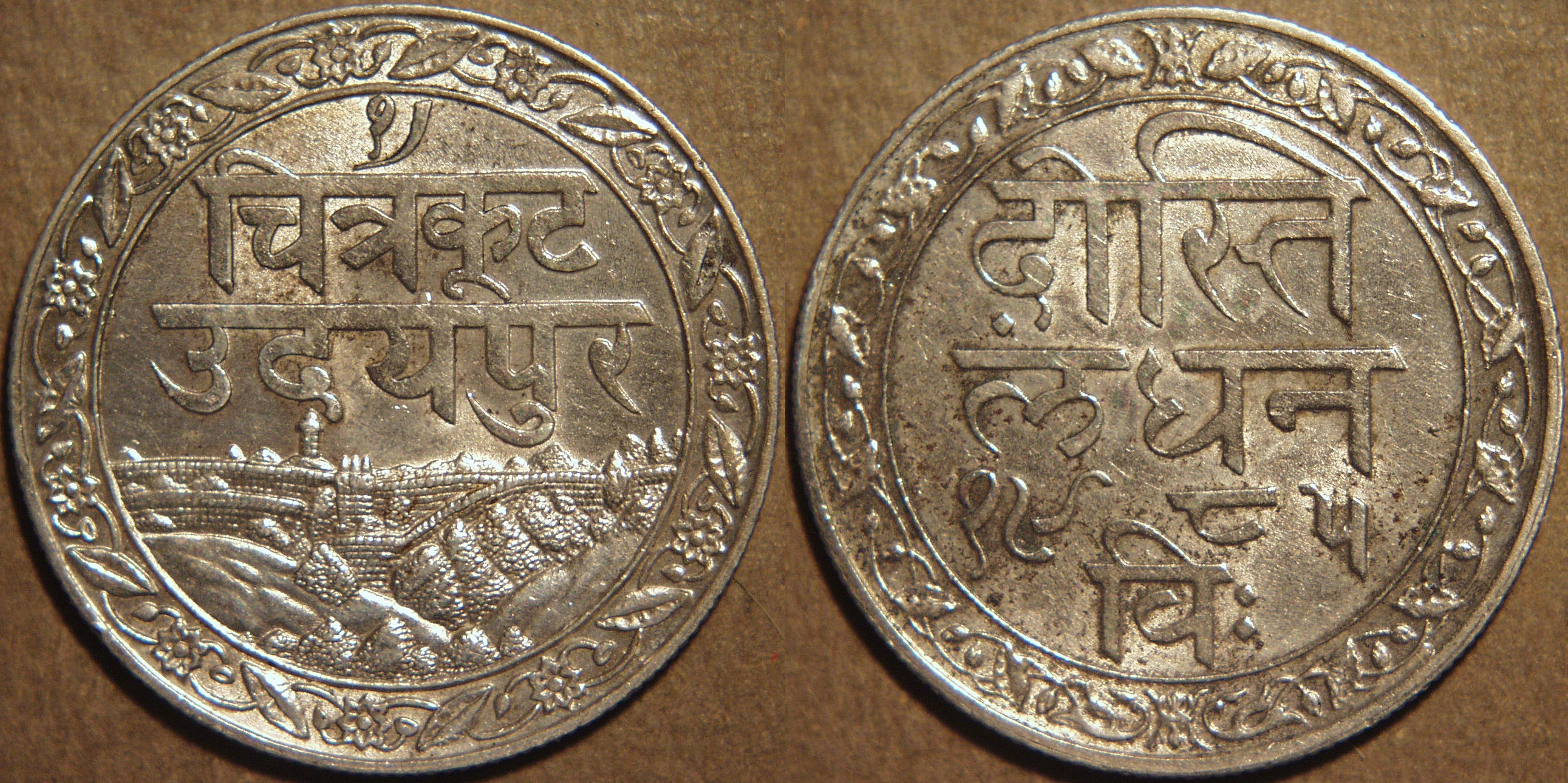
|
Anonymous Silver rupee (c. 1931-32)
Weight: 10.84 gm. Diameter: 31 mm Die axis: 12 o'clock
Mark for 1 (rupee), Nagari legend chitrakut udaipur with detailed representation of the ramparts
of Chittorgarh below, all within an ornamental border /
Nagari legend: dosti landhan (friends of London) within decorative border, date 1985 vi(kram) below
Reference: KM Y22
|
 |
Probably ordered by Fatteh Singh (1884-1930) but issued only after his death in 1931-32, the Fatteh Shahi series of
coins were machine-made coins, minted in Calcutta. They retained the essential design of the Swarup Shahi Series, except that the representation of the
Chittorgarh fort was now much more carefully detailed. The Victory Tower can be clearly seen. The date on the coins, Vikram 1985, which corresponded to
1928 of the Common Era, was probably the date on which the coins were first ordered, although they were actually struck only a few years later.
|
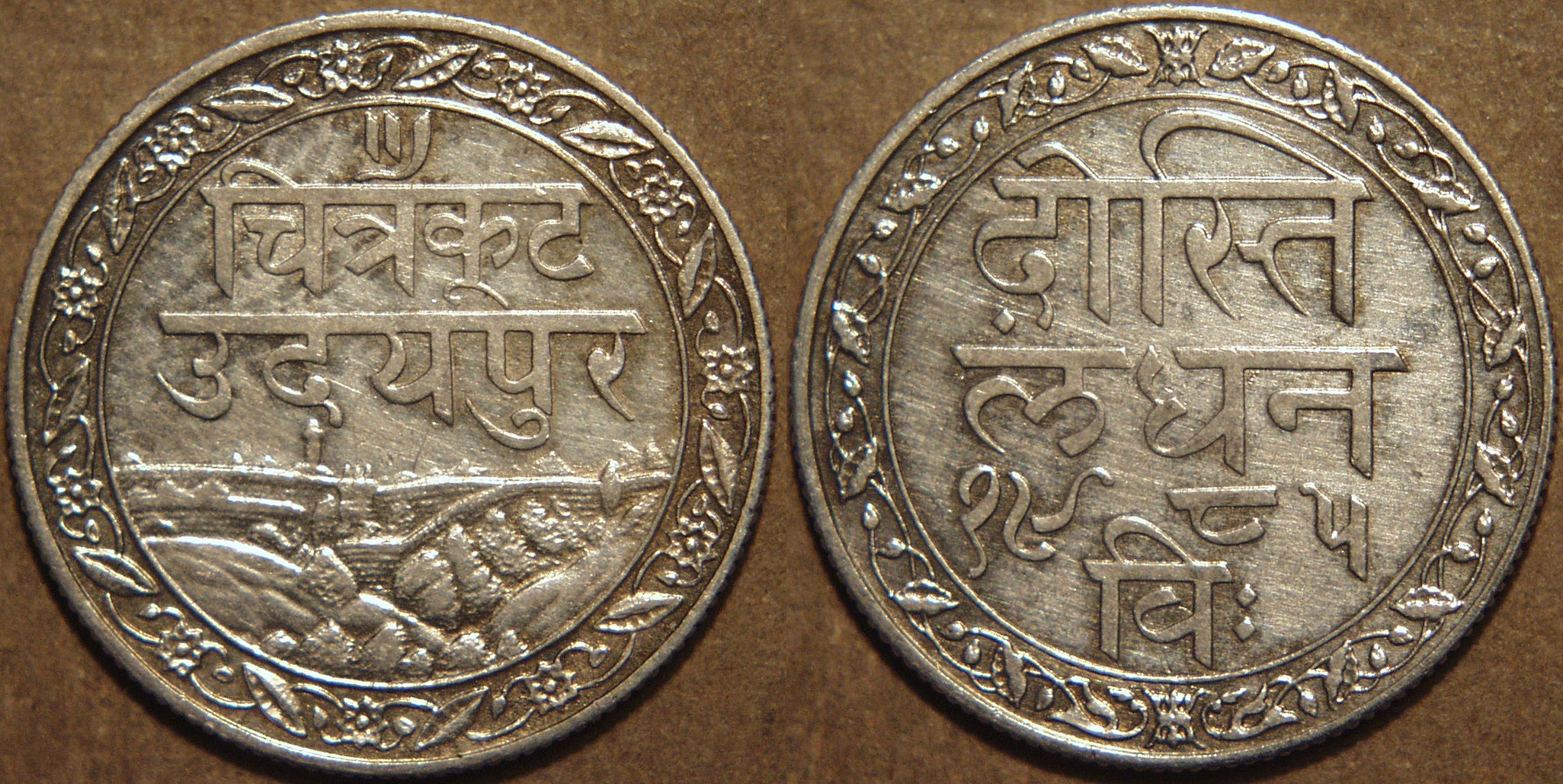
|
Anonymous Silver half rupee (c. 1931-32)
Weight: 5.38 gm. Diameter: 24.5 mm Die axis: 12 o'clock
Mark for 1/2 (rupee), Nagari legend chitrakut udaipur with detailed representation of the ramparts
of Chittorgarh below, all within an ornamental border /
Nagari legend: dosti landhan (friends of London) within decorative border, date 1985 vi(kram) below
Reference: KM Y21
|
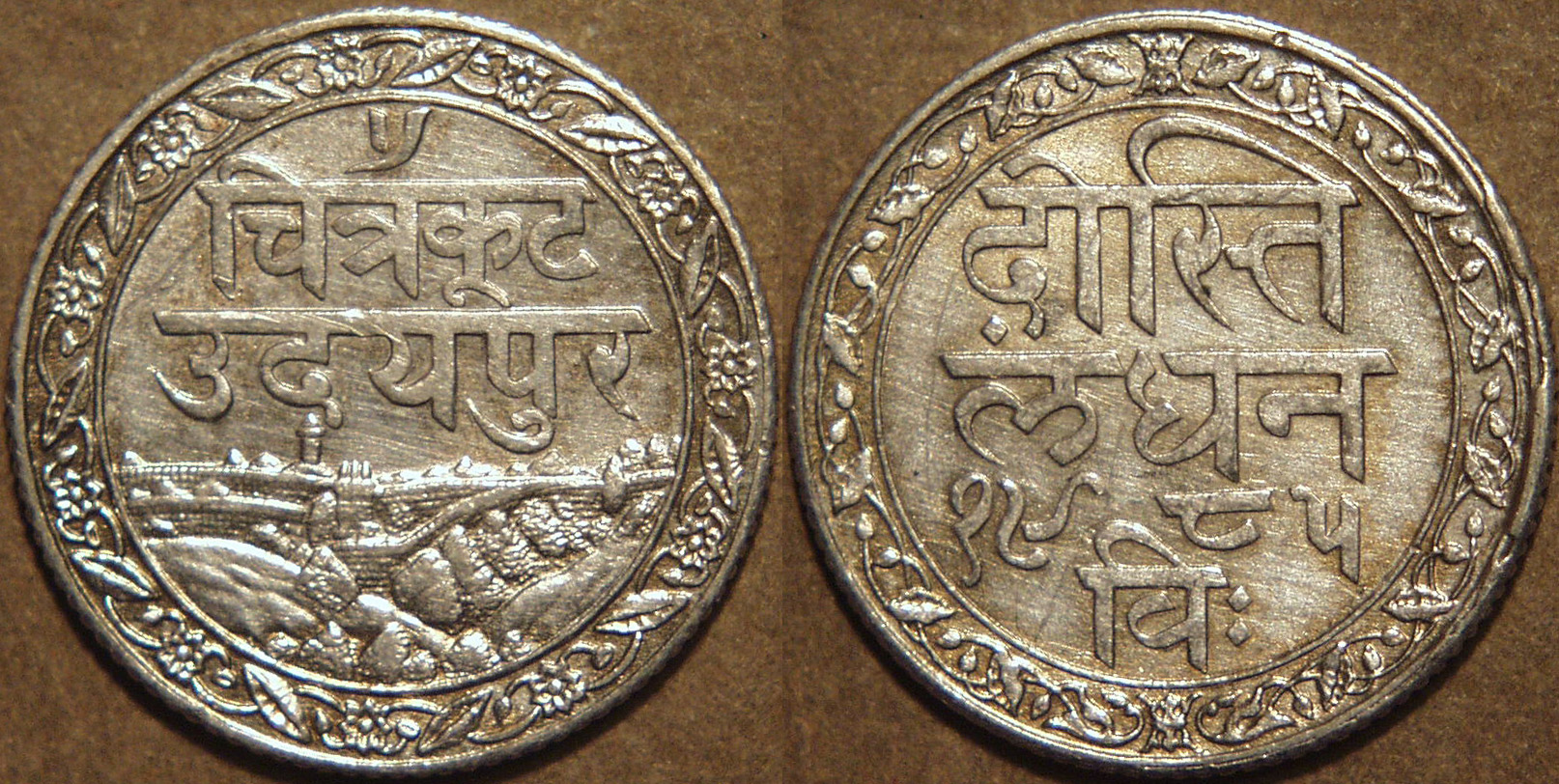
|
Anonymous Silver quarter rupee (c. 1931-32)
Weight: 2.72 gm. Diameter: 19.5 mm Die axis: 12 o'clock
Mark for 1/4 (rupee), Nagari legend chitrakut udaipur with detailed representation of the ramparts
of Chittorgarh below, all within an ornamental border /
Nagari legend: dosti landhan (friends of London) within decorative border, date 1985 vi(kram) below
Reference: KM Y20
|
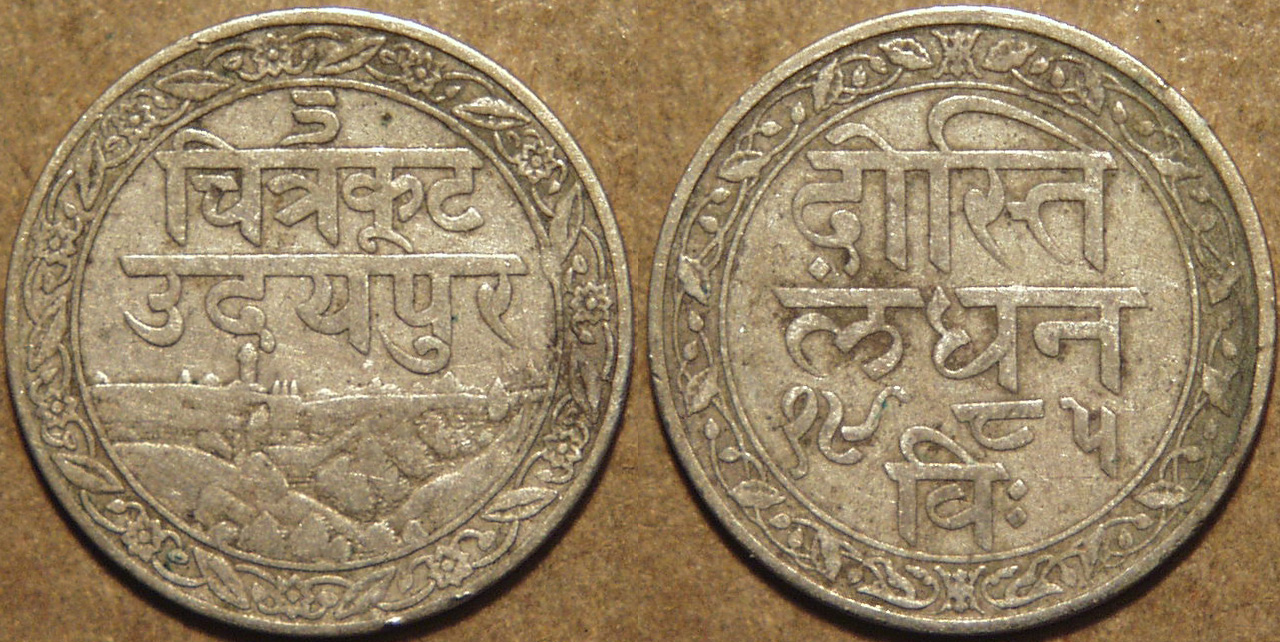
|
Anonymous Silver one-eighth rupee (c. 1931-32)
Weight: 1.33 gm. Diameter: 15.5 mm Die axis: 12 o'clock
Mark for 1/8 (rupee), Nagari legend chitrakut udaipur with detailed representation of the ramparts
of Chittorgarh below, all within an ornamental border /
Nagari legend: dosti landhan (friends of London) within decorative border, date 1985 vi(kram) below
Reference: KM Y19
|

|
Anonymous Silver one-sixteenth rupee (c. 1931-32)
Weight: 0.93 gm. Diameter: 12 mm Die axis: 12 o'clock
Mark for 1/16 (rupee), Nagari legend chitrakut udaipur with detailed representation of the ramparts
of Chittorgarh below, all within an ornamental border /
Nagari legend: dosti landhan (friends of London) within decorative border, date 1985 vi(kram) below
Reference: KM Y18
|

|
Anonymous Copper pie, 1921
Weight: 2.04 gm. Diameter: 16 mm Die axis: 6 o'clock
Nagari legend udaipur with ornamental panels above and below /
Nagari legend: chitor with ornamental panel above and Vikram date 1978 (=1921 CE) below
Reference: KM Y14
|
 |
Bhupal Shahi Series (c. 1932-48) |
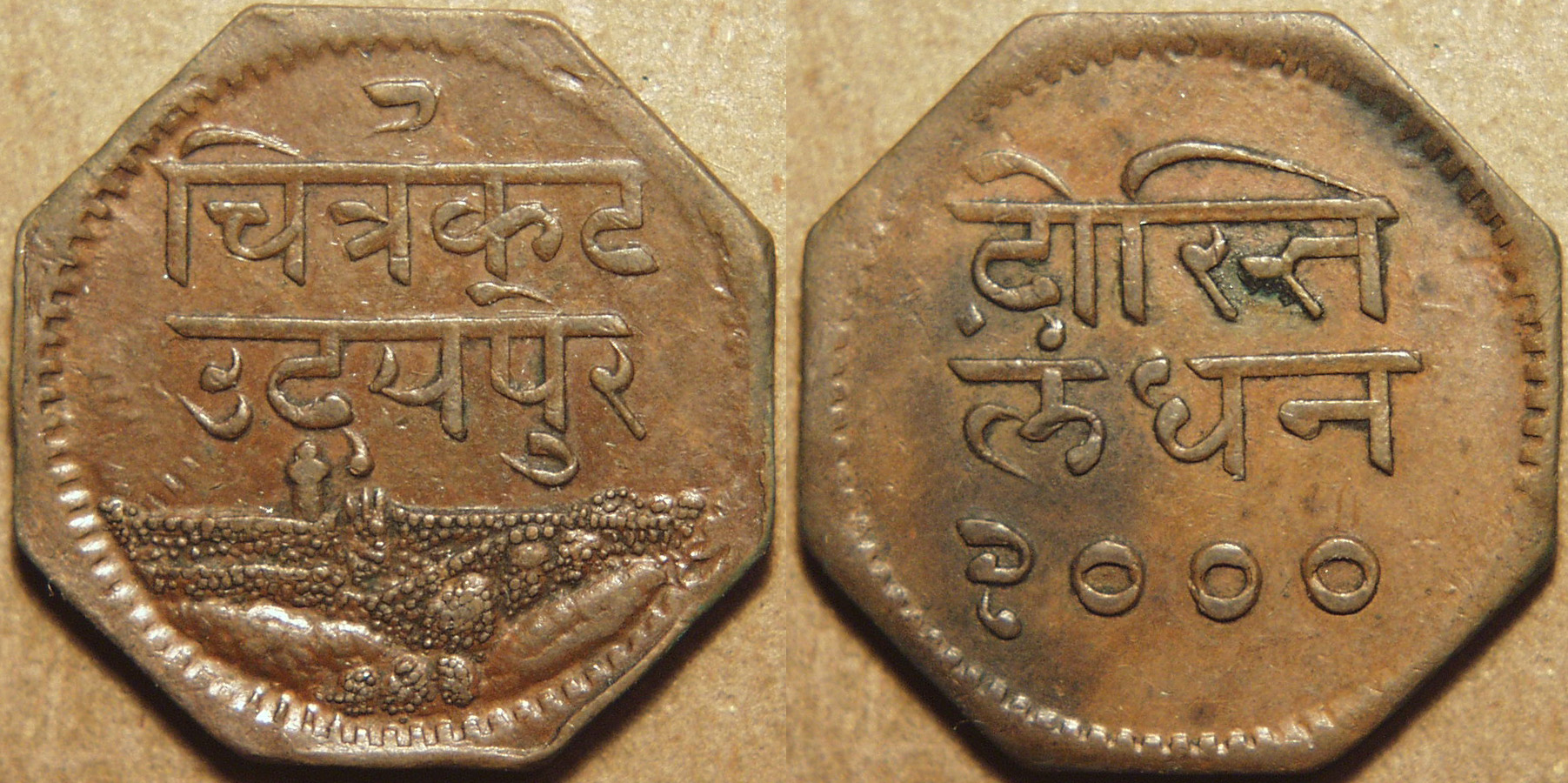
|
Anonymous Copper anna (1943)
Weight: 4.69 gm. Diameter: 21.5 mm Die axis: 12 o'clock
Mark for 1/16 (rupee), Nagari legend chitrakut udaipur with detailed representation of the ramparts
of Chittorgarh below, all within a dentil border /
Nagari legend: dosti landhan (friends of London) within dentil border, date 2000 below
Reference: KM Y17
|
 |
During the reign of Bhupal Singh (1930-48), it appears that no silver coins were struck, only a copper series The coins
in this series had different shapes for the different denominations.
|
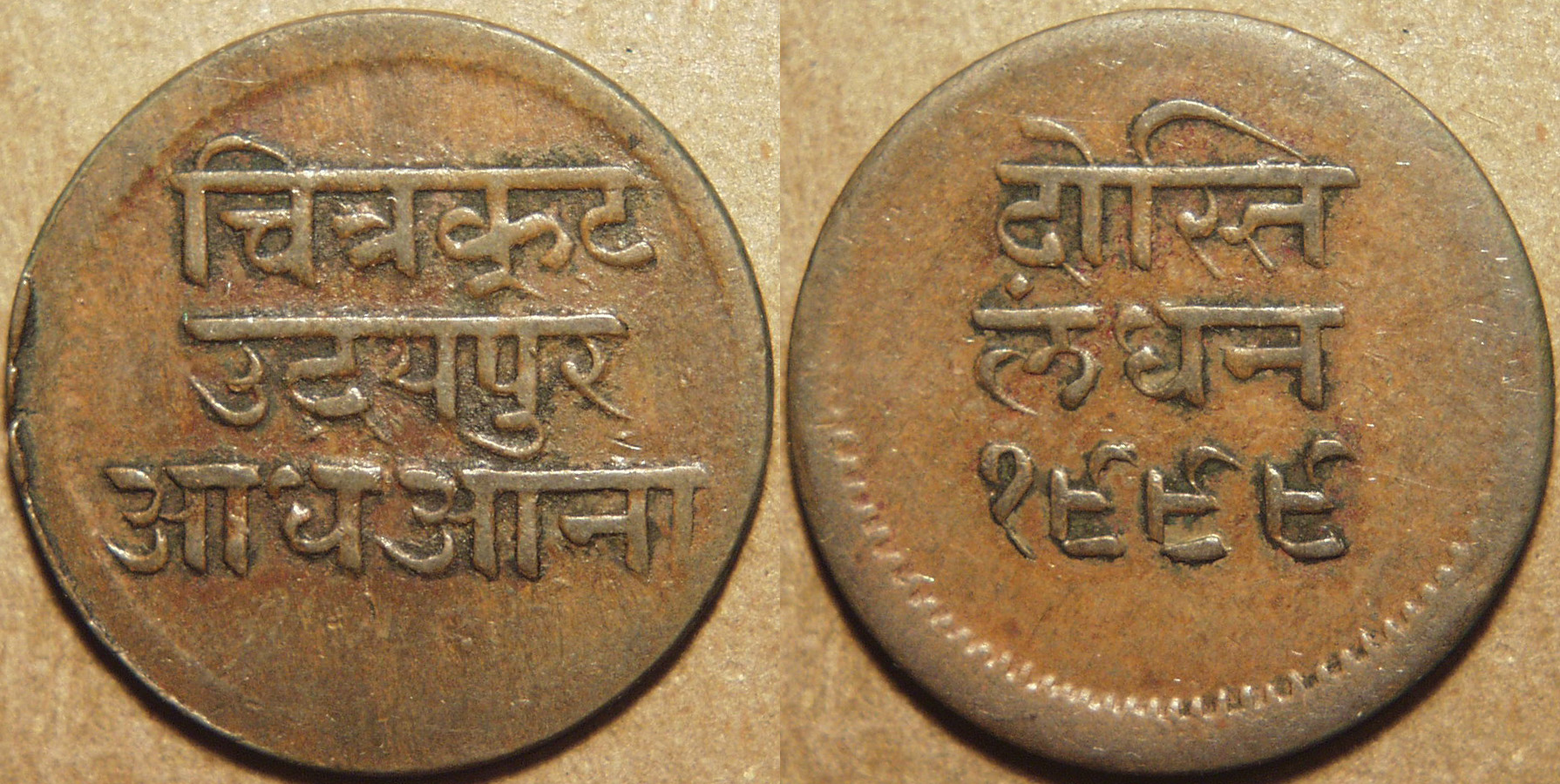
|
Anonymous Copper half anna (1942)
Weight: 3.24 gm. Diameter: 21.5 mm Die axis: 11 o'clock
Nagari legend chitrakut udaipur aadha aana (half anna) /
Nagari legend: dosti landhan (friends of London), date 1999 below
Reference: KM Y16
|

|
Anonymous Copper quarter anna (1942)
Weight: 2.13 gm. Dimensions: 19 x 19 mm Die axis: 12 o'clock
Nagari legend chitrakut udaipur paav aana (quarter anna) /
Nagari legend: dosti landhan (friends of London), date 1999 below
Reference: KM Y15
|
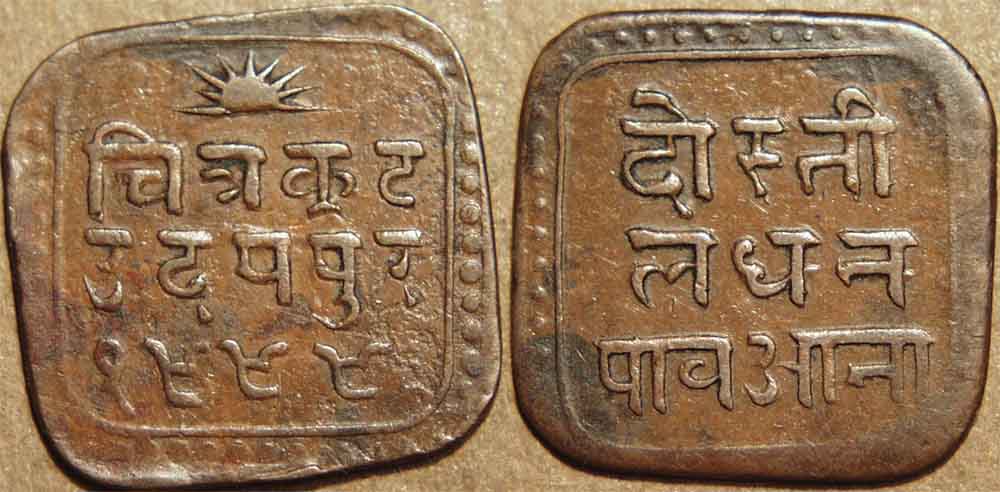
|
Anonymous Copper quarter anna (1942)
Weight: 2.24 gm. Dimensions: 19 x 19 mm Die axis: 12 o'clock
Nagari legend chitrakut udaipur paav aana (quarter anna) /
Nagari legend: dosti ladhan (friends of Lodon), date 1999 below
Reference: KM Y15
|
 |
Note the mis-spelling of London as ladhan (Lodon).
|
 |
 |
 |
Fractional Paisas from Umarda |
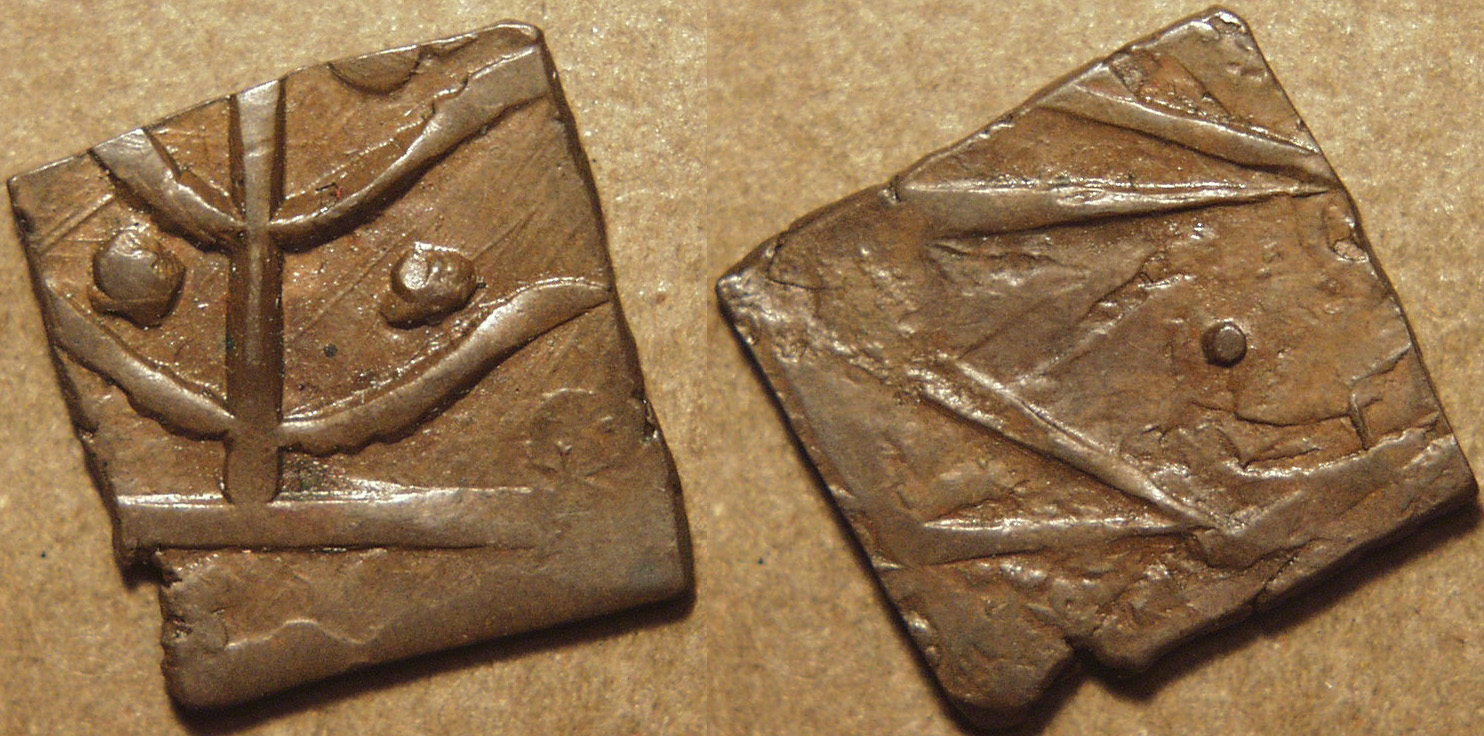
|
Anonymous AE half paisa (c. 19th-20th century)
Weight: 1.64 gm. Dimensions: 14 x 15 mm
Tree or double trident ? /
Banner ?
Reference: KM Y24
|
 |
These coins were apparently struck by local coppersmiths in the small town of Umarda, some 10 miles
outside Udaipur, and would have provided much-needed small change for the market.
|
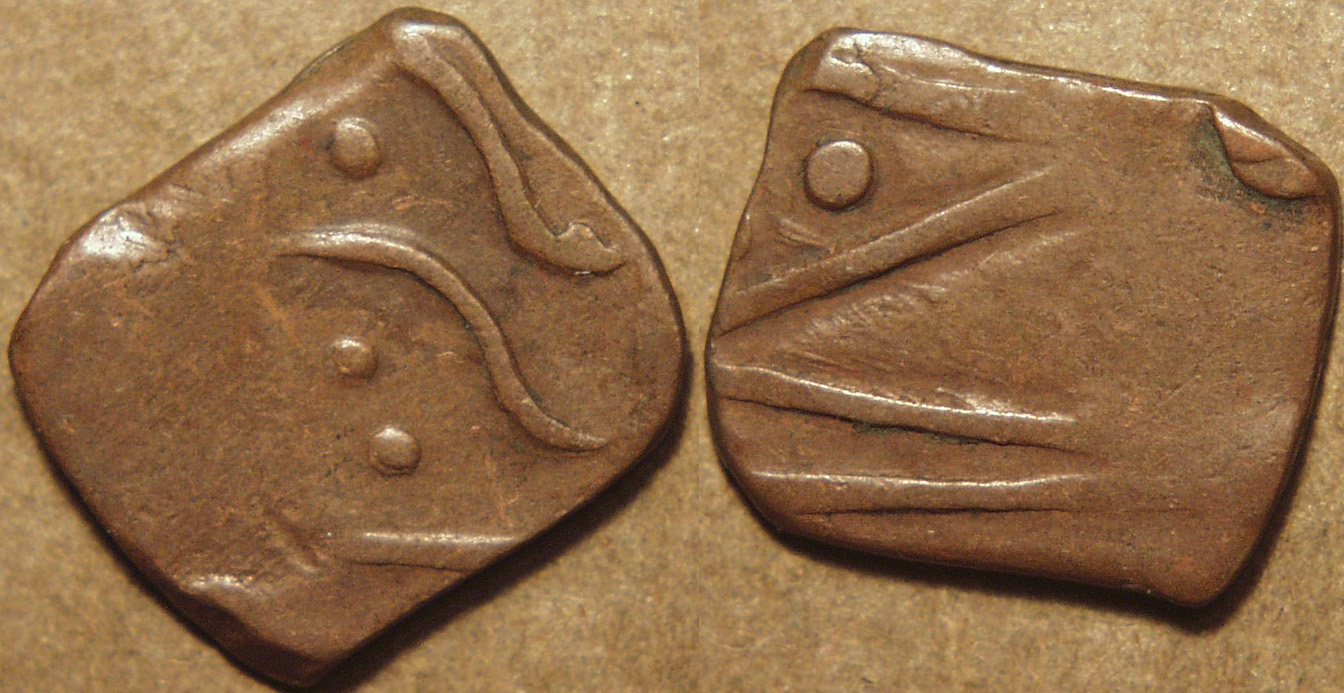
|
Anonymous AE half paisa (c. 19th-20th century)
Weight: 1.80 gm. Dimensions: 12 x 15 mm
Tree or double trident ? /
Banner ?
Reference: KM Y24
|
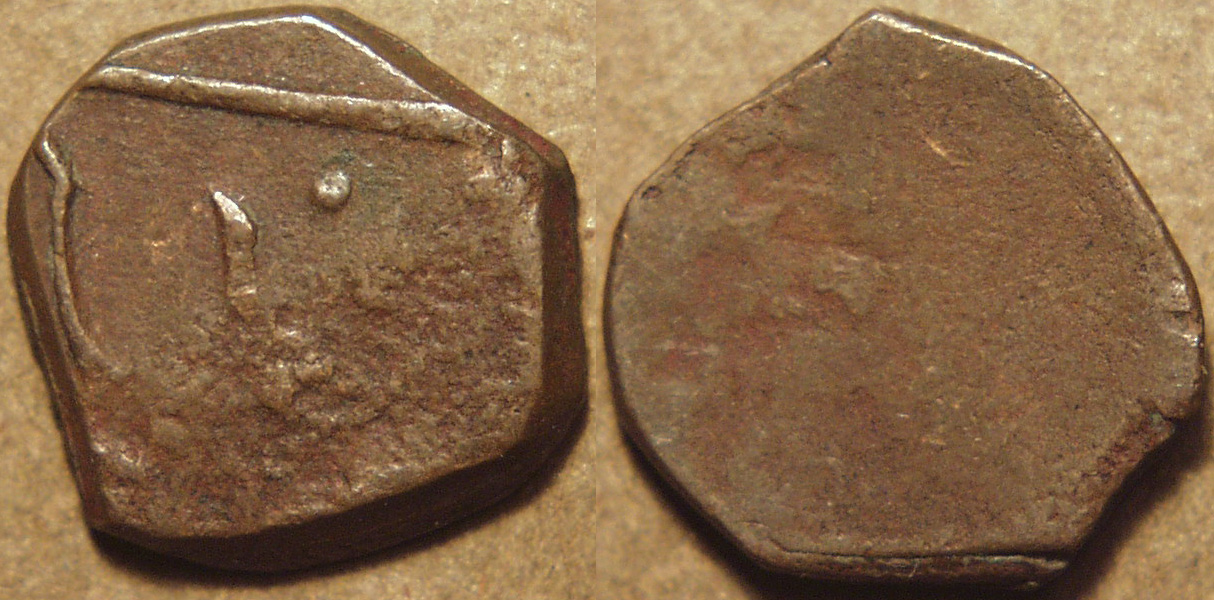
|
Anonymous AE half paisa (c. 19th-20th century)
Weight: 2.37 gm. Dimensions: 14 x 13 mm
Tree or double trident ? /
Banner ?
Reference: KM Y24
|
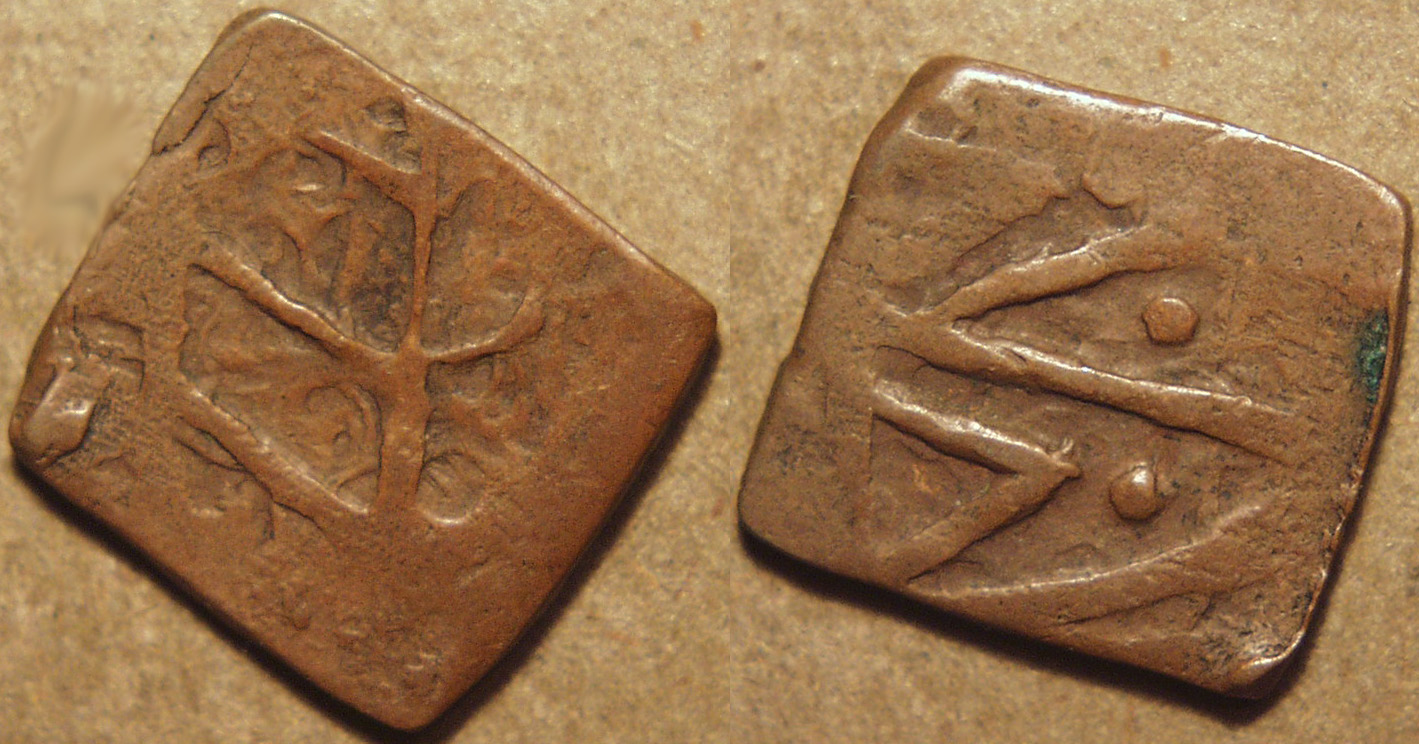
|
Anonymous AE half paisa (c. 19th-20th century)
Weight: 1.82 gm. Dimensions: 14 x 13 mm
Tree or double trident ? /
Banner ?
Reference: KM Y24
|
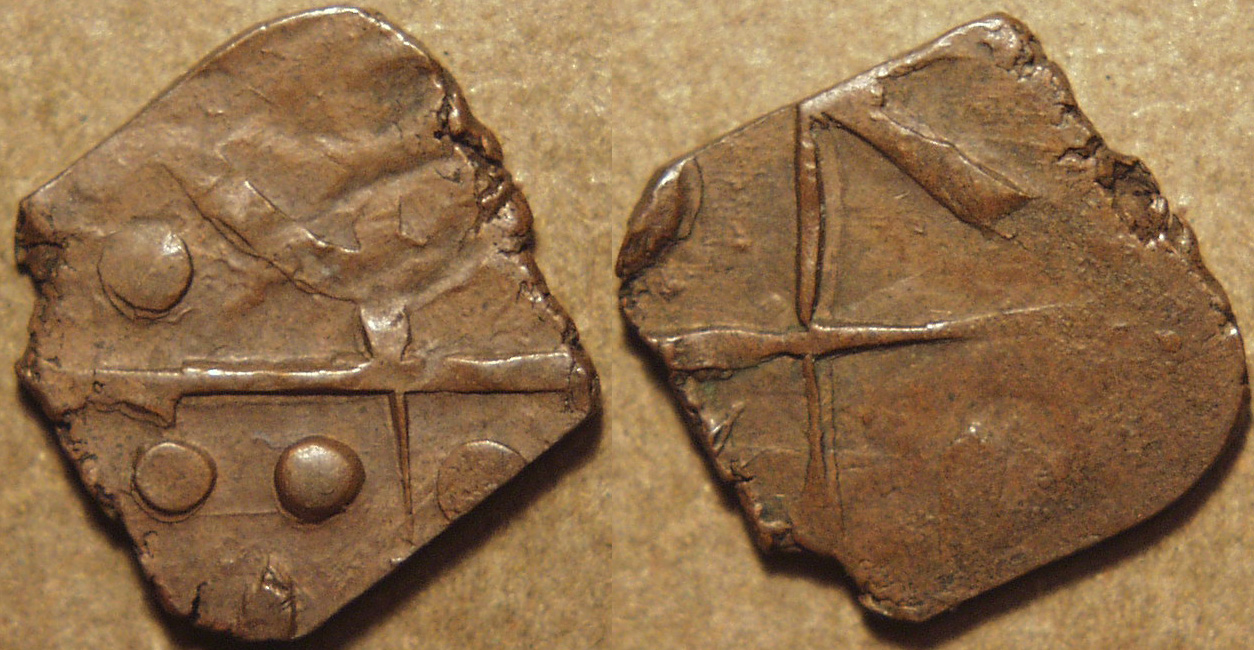
|
Anonymous AE half paisa (c. 19th-20th century)
Weight: 1.53 gm. Dimensions: 13 x 13 mm
Tree or double trident ? /
Swastika ?
Reference: KM Y24
|

|
Anonymous AE half paisa (c. 19th-20th century)
Weight: 1.71 gm. Dimensions: 12 x 13 mm
Tree or double trident ? /
Banner ?
Reference: KM Y24
|

|
Anonymous AE half paisa (c. 19th-20th century)
Weight: 1.75 gm. Dimensions: 14 x 13 mm
Tree or double trident ? /
Banner ?
Reference: KM Y24
|